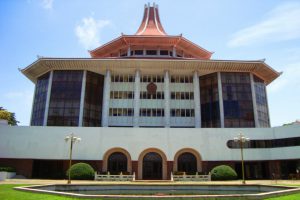Court of Appeal of the Democratic Socialist Republic of Sri Lanka: Mahinda Samayawardhena, J. contemplated an appeal against the judgment passed by the District Court in a suit for declaration.
The factual matrix of the case was that the plaintiff instituted a suit in a District Court where she sought declaration stating that ‘she was the lawful permit holder issued under the Land Development Ordinance’ hence, she was lawfully entitled to the possession of the said land. Further ejectment of the defendant was also sought along with the recovery of damages. On the contrary, the defendant requested the plaintiff’s suit to be dismissed as she was the original permit holder and sought a declaration in this regard. There was no dispute that it was the defendant who was in possession of the land at the time of the institution of the action. Plaintiff stated in her evidence that in 1974 the possession was transferred to a person in lieu of some money but after several years when the plaintiff checked she found the defendant in the possession. Defendant then admitted that the possession was transferred to her by the same person of whom the plaintiff was admitting to transfer.
The crucial question decided by the District Court was ‘whether the second Permit issued in favour of the Defendant was invalid and therefore the first Permit issued in favour of the Plaintiff was still valid.’ After trial, the learned District Judge held, with the Plaintiff on those issues and entered judgment for the Plaintiff as prayed for in the prayer to the plaint. Hence, the defendant instituted an appeal against the judgment in favor of the plaintiff.
The Court, observed that the District Court had committed several errors while passing the judgment such as, firstly the Divisional Secretary who issued a permit should have been made a party to the suit, as the evidence was important in that respect. Secondly, the District Court was not authorized to decide the validity of the second permit issued in favor of the defendant, such exercise was a blatant violation of the fundamental rule of natural justice of audi alteram partem. The Court held that “No Court has the right to decide against a person who is not a party to the case and who has not been given a hearing.” It was further held by the Court that the position taken up by the Plaintiff before the District Court that the Defendant’s permit was issued pending the action was also, for the same reason, untenable. Hence, the Court favored the State and stated that the State was not bound by the judgment of the District Court.
Another issue which was observed by the Court was that the District Court escaped the copy of permit which was tendered by the Plaintiff with the plaint was Ex-facie cancelled and an endorsement was made to the Divisional Secretary. Thus, the Plaintiff knew before filing the case that the Permit which she relied on to file this case was a cancelled Permit although she claimed a declaration from Court that she was the lawful Permit holder of the land. Then it was abundantly clear that the Plaintiff essentially sought the main relief against the Divisional Secretary although the Divisional Secretary was not made a party.
It was observed that the District Court noted that the cancellation of the Plaintiff’s permit was clearly proved to defeat the claim of the Plaintiff. Further, the decision of the Divisional Secretary was upheld and stated correctly by the Court as the Plaintiff had virtually sold the land to the third party in 1974 and quit the possession of the land thereafter voluntarily. Court held that as a blatant violation of one of the many conditions of the permit, which enabled the State to cancel the permit after the inquiry.
The judgment passed by the District Court was set aside as the District Judge had placed great reliance on the receipt produced to say that the fine imposed on the Plaintiff for violation of a condition of the permit, namely, failure to occupy and possess the land, had been paid but on the one hand, there was no evidence that the receipt was produced by the Plaintiff at the inquiry and on the other hand, payment of the fine did not give authority to the Plaintiff to continue to violate the conditions of the permit. It was stated so in the letter itself. Admittedly, the Plaintiff had never gone into possession of the land after 1974.[Weerasinghe Hettige Stela v. H.M. Bala Manike, 2019 SCC OnLine SL CA 10, decided on 02-09-2019]

